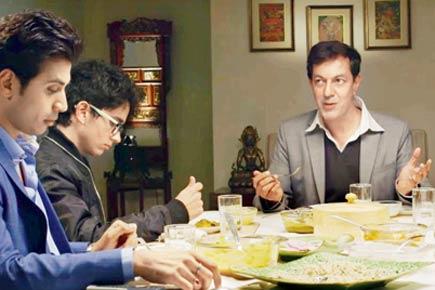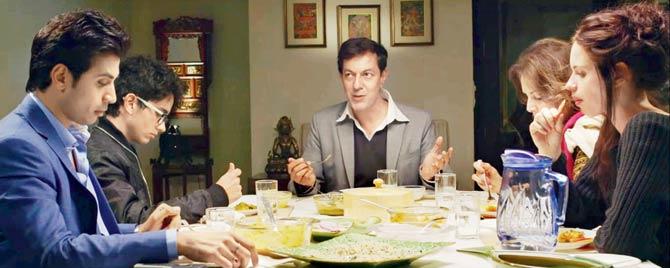Talking about a rare film, releasing this Friday, that looks at the ’90s, when India and its pop culture began to change irreversibly


Mantra records a time that's exponentially turning into ancient Indian history already
 Yes, as George Bush Sr put it in the late '80s: "Read my lips." Or as the popular ad translated that in the mid '90s: "Bole mere lips." I love Uncle Chipps. Really do. The last time I found this nearly extinct specimen, it was casually tucked away between several snazzier looking bags of similar chips brands at Duke's: a sasta eatery next to my place on Bandra's Chapel Road. That sudden sighting instantly warmed the cockles of my heart. This new Uncle Chipps, to be fair, was very slickly packaged too, and easier to rip into. But the taste was a bit fraudulent, if you may.
Yes, as George Bush Sr put it in the late '80s: "Read my lips." Or as the popular ad translated that in the mid '90s: "Bole mere lips." I love Uncle Chipps. Really do. The last time I found this nearly extinct specimen, it was casually tucked away between several snazzier looking bags of similar chips brands at Duke's: a sasta eatery next to my place on Bandra's Chapel Road. That sudden sighting instantly warmed the cockles of my heart. This new Uncle Chipps, to be fair, was very slickly packaged too, and easier to rip into. But the taste was a bit fraudulent, if you may.
ADVERTISEMENT
Which isn't to suggest that any fancy bag of branded chips, 80 per cent full of air, hosting severely rationed super-slim fried slices that cost a 1,000 per cent more than one potato, is anything but a fraud product to start with. But that blandly salty chomp of Uncle Chipps - like the masala flavour in the soggy Flips, and Crax; and the crackling crunch in the home-fried Fryums - still lingers in my mouth. What to do?
I feel the same level of disappointment heading into Nirula's in Delhi-ordering the childhood favourites, 'cheese capsicum onion pizza', or the 'tandoori sampler' - to realise it's not the same anymore. Nirula's, a local desi chain, once owned by one Mr Narula, got passed on to a Malaysian corporation, and is now, if I'm not mistaken, owned by a relatively faceless, NY-based private equity firm.
Sure, nostalgia is an exaggeration. But '90s, as you may have noticed, is the new retro. More about independent India and its pop culture changed in that decade than all the others before it combined. And food equals memories. What specifically changed with the '90s, and the opening up of Indian economy?
My understanding of business is as dodgy as the confounded journalists' grasp of the goings-on in Indian politics at this point. But Uncle Chipps, if you take a cursory glance, owned by the Indian company Amrit Agro, launched in 1992, held over 70 per cent of the chips' market in 1998. This dropped to around 30 per cent by 2000. It finally got sold to Pepsico that makes the international Lay's.
For the lead character KK (Rajat Kapoor) in Nicholas Kharkongor's smartly scripted, almost melancholic debut Mantra, which releases in theatres this Friday, this tragedy around the loss of the homegrown Uncle Chipps is far more personal than an average consumer's. KK owns King's Chips. For 12 years, it has been the crowned leader in the organised wafers' market. One morning KK walks into his local kirana store to find it altogether littered with Kipper Chips, owned by the multi-national Kipper Cola, that incidentally is headed by one Indira Puri. He's managed stave off a "buy-out" from Kipper Cola for around five years already.
It's slightly unclear when exactly this film is set. But the Akai music system at homes and second generation cell-phones in everyone's hands is a giveaway. It would be the late '90s to early 2000s, around the time I was once bitching about the fakeness of Campa Cola (they even mimicked the Coca Cola font) at a party to a college-mate JJ, whose family, I realised later, owned Campa Cola! I don't know what his family does now (I guess hotel Le Meridien in Delhi is still theirs).
The movie Mantra, impressively enough, also touches upon the collusion among 'socialist cronies' that had fashioned an economy gamed against any external competition - perpetuating a politics-business-broker network that forced you to "suck up to the system" to survive. Among KK's best buddies, one is a central minister, the other (Dan Hussain, spot on) is a typical Delhi broker type. Although ostensibly self-made, and belonging to the educated elite, KK's married to influence. His father-in-law is a Governor.
The title Mantra, by the way, refers to a hospitality chain start-up (restaurant/night-club) that KK's son has founded, without his dad's help, using private equity investment. The location is used perfectly to show the rise of the close-minded cultural "right-wing", which ironically arose at the same time as the opening up of the Indian economy.
Now I'm not getting into the specifics of the film. There are quite a few issues. And some fine stuff, including long, steady visual passages, which indicate both maturity, and confidence, on the part of its first-time filmmaker. Actor Naseeruddin Shah once defined a "significant film" to me, as "one, which acts as a record of its times." Naseer, according to me, has worked on two of the best movies accurately mirroring upper-class India: Masoom, and Monsoon Wedding. Both, like Mantra, were set in Delhi.
By his definition, Mantra would be a very significant film, if not rare - recording a time that's exponentially turning into ancient Indian history already. This is not a review. Important disclaimer: The film has been directed by a friend. I can't trust my own judgment on my friends' works. We love what they do. That's why they're friends. And yes, I still love Uncle Chipps. Or maybe it's just the memory. Like all memories, it will just stay forever. As should the movie.
Mayank Shekhar attempts to make sense of mass culture. He tweets @mayankw14. Send your feedback to mailbag@mid-day.com
 Subscribe today by clicking the link and stay updated with the latest news!" Click here!
Subscribe today by clicking the link and stay updated with the latest news!" Click here!







